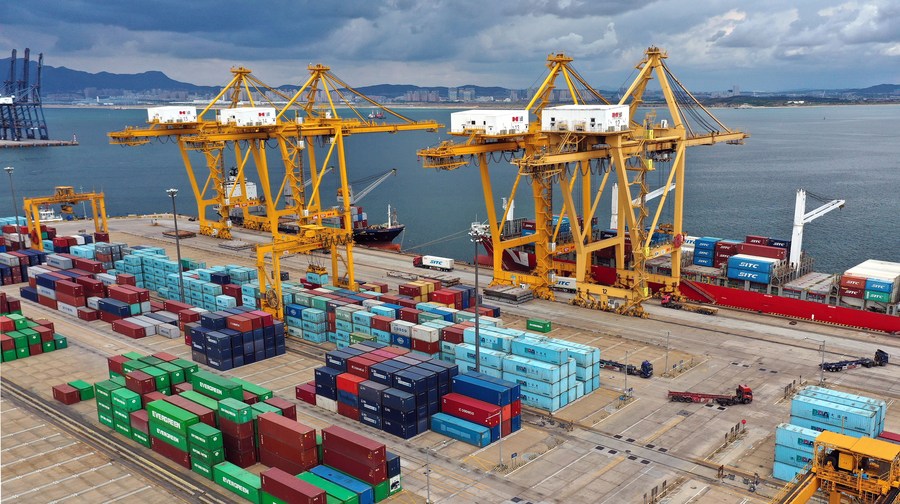
Aerial photo shows containers at Dalian port in northeast China's Liaoning Province, September 24, 2020. /Xinhua
Aerial photo shows containers at Dalian port in northeast China's Liaoning Province, September 24, 2020. /Xinhua
Editor's note: John Gong is a professor at the University of International Business and Economics and a research fellow at the Academy of China Open Economy Studies at UIBE. The article reflects the author's opinions and not necessarily the views of CGTN.
It has been about nine years since the cooperation between China and Central and Eastern European countries (China-CEEC) initiative was first started in Budapest, Hungary.
Under the direction of annual summits by leaders in both sides, much traction has been witnessed over the years in areas of trade and investment, infrastructure development, and promotion of ties in the areas of culture, education and tourism.
Total exports and imports volume exceeded $100 billion in 2020, thanks to the complimentary nature of trade and the direct Sino-European rail freights.
On February 9, at the latest China-CEEC Summit, Chinese President Xi Jinping delivered a speech via video link to describe the direction for the future. Among other things, he emphasized that the China-CEEC cooperation is based on mutual respect and equality, and more importantly, based on no political strings attached.
This is an important issue as there appears to be a resurgence of political attacks led by the United States and followed closely by some CEE countries on China's human right record in Hong Kong Special Administrative Region and Xinjiang Uygur Autonomous Region.
Aside from the baseless accusations, it is indeed disappointing to see developments of such voices from a region that once experienced its own intolerance of political diversity under the reign of the former Soviet Union.
One thing learned during and after the Cold War is that different countries have unique circumstances and no single one political system stands above anyone else. Bilateral and multilateral economic relationships should not be hijacked by unilateral political agendas.
Some backlash of the China-CEEC cooperation could also be possibly caused by a knee-jerk reaction to the disappointment that a massive amount of capital infusion as a part of the Belt & Road Initiative to jump-start some countries' economy hasn't materialized so far.

A Chinese Railway Express freight train leaves for Prague, the Czech Republic from Yiwu, east China's Zhejiang Province, September 9, 2017. /Xinhua
A Chinese Railway Express freight train leaves for Prague, the Czech Republic from Yiwu, east China's Zhejiang Province, September 9, 2017. /Xinhua
But China is not likely to solve economic problems in each of the 17 countries there. As President Xi said, both sides need to plan for infrastructure and other investment projects in consideration of realistic expectations and synergies driven each country's natural endowments.
The third possible reason is traced to the kind of Machiavellian geopolitical maneuvers that some Europeans are familiar with. For example, Jeremy Garlick at the Prague University of Economics and Business has been peddling the view that China is pursuing an assertive strategy of "divide and conquer" designed to benefit China at Europe's expense.
Some politicians in Brussels also bought into this view and view the China-CEEC cooperation as an effort to drive a wedge between Western Europe, or the old Europe and the CEE region, or even the new Europe.
Yet other European politicians support it due to the concern for loss of business as a result of the Sino-European rail freights linking the cargo transfer ports in Western Europe. Thankfully, all of these things have been rejected by the European Commission and the European Parliament.
The true tenet of "no political strings attached" lies in the respect for political diversity in different countries, and upholding the principle of no internal political interference in another country.
China harbors no political ambition in the CEE region, nor has any design for the future of Europe. Historically we have never meddled in local affairs of any CEE country, and we would naturally expect this foreign policy be reciprocated in turn by our partners in the region.
During the current COVID-19 pandemic, China helped greatly some CEE countries with medical supplies and vaccines. Today's summit affirms the direction that the China-CEEC cooperation is headed into - mutual benefits through trade and investment without any political strings attached.
(If you want to contribute and have specific expertise, please contact us at opinions@cgtn.com.)

